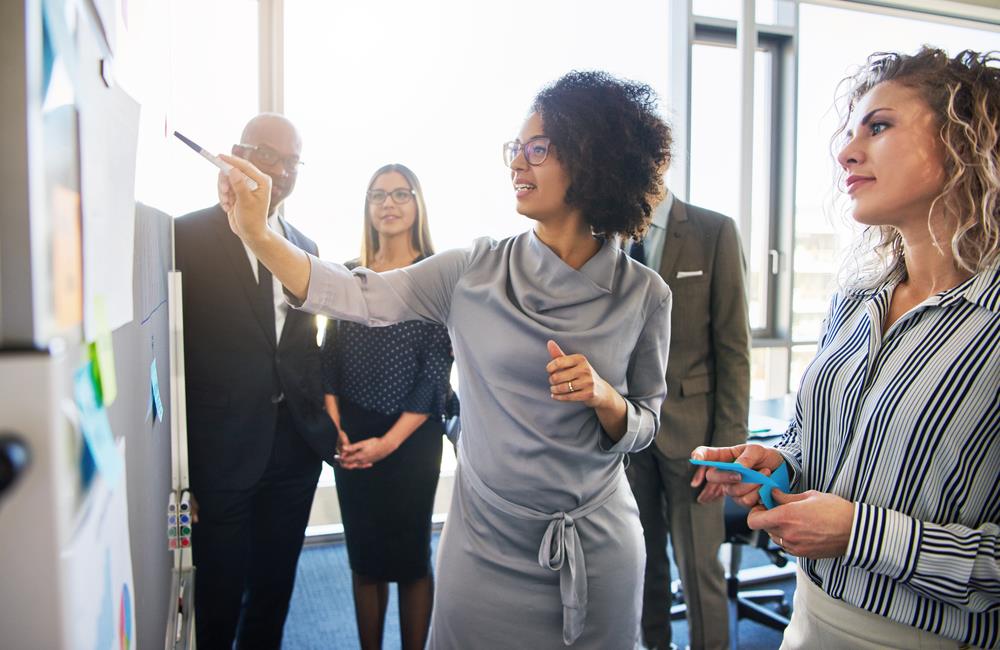- Employer Resources
- |
- Last Updated: February 08, 2023

As an HR professional, you know how time-consuming interviewing can be. That’s why it’s no surprise that we’re seeing an uptick in group interviews, especially in industries that have busy periods and high turnover like retail, hospitality, and foodservice. While they’re growing in popularity, many employers are still asking: What is a group interview? Would I benefit from using them?
Read on to learn how to conduct a group interview and whether it’s the right format for the positions you’re hiring for.
What is a group interview?
In a group interview, an employer will interview multiple candidates at one time. This is different from a panel interview, which involves one candidate and multiple interviewers.
Often, a group interview will include a team activity where candidates work together to solve a problem or role-play a scenario. Afterward, the interviewer may ask candidates to answer questions about the activity. Some employers will also ask additional questions outside of the activity to gauge candidates’ fit for the position.

Why would I use group interviewing?
Group interviews are effective for employers who are hiring a large number of people in a short period of time. For example, retail stores may use group interviewing to hire extra employees before the busy holiday season. Or, a hospitality employer may conduct a group interview to hire staff for an upcoming event.
You may also find them useful if you’re hiring for customer-facing or fast-paced roles. Many employers find that they’re an effective tool for evaluating skills like teamwork, interpersonal communication, and problem-solving skills. Observing how candidates behave in a group setting and respond to a challenge can provide great insight into how they would perform on the job.
Create Your Account Today
What are the drawbacks of a group interview?
Group interviews are more complicated to facilitate, and they take the focus off individuals. This could leave candidates feeling like “just a number” and make it more difficult for you to evaluate the unique traits of each applicant.
Don’t use this approach if you’re trying to fill a highly specialized role – group interviews work best for more general positions, like a server or salesclerk. Also, if you’re not on a tight timeline, you may benefit from interviewing candidates individually.

How do you conduct a group interview?
Deciding how to conduct a group interview will depend on the role you’re hiring for and the traits you’re evaluating. However, employers will typically break it into two sections: a team activity and a question period.
The team activity – whether that’s a case study, a challenging task, or a simulation – is meant to give you insight into how each candidate works in a group setting. Who in the group is a natural leader? How do each of them interact? Are they participating? Are they communicating effectively? These are some questions you may ask yourself as you’re observing and taking notes on each of the candidates.
After the activity is over, you may choose to debrief with the group to learn more about the group dynamic and how individuals contributed to their team. Ask questions that require an earnest response and get to the heart of how each person communicates and behaves on a team.
For example, here are a handful of appropriate questions to ask candidates in a group interview:
- Which team member would you choose to hire, and why?
- How did you contribute to your team?
- What were some ways that your team struggled?
You can also ask standard behavioral or experience-related questions before or after the team activity. Or, you may choose to save these questions for individual interviews once you’ve narrowed down some top candidates from the group.

However you decide to conduct your group interview, here are some tips to ensure it goes smoothly:
- Let your candidates know. Prior to the interview, explain to your candidates what a group interview is and what they should expect. There’s nothing worse than preparing for a one-on-one interview and walking into a room full of other candidates.
- Enlist facilitators. If your group is larger than five or six, ask other members of your team to help you conduct the interview. They can help observe the activity, conduct questioning, and take notes. This is especially important if you break your group into smaller teams.
- Keep it structured. With so many candidates, it can be hard to keep things on track. Go in with a plan, and make sure your facilitators know exactly what to do and which questions to ask.
- Take notes. Don’t make the mistake of thinking you’ll remember details for every interviewee. Take thorough notes on each candidate so that you’re able to fairly evaluate after the interview.
- Treat it like a discussion. Just like a regular interview, try to facilitate conversation. You can still target questions toward individuals, but you’ll get more insight on how your candidates communicate if you have an open discussion.
- Debrief. Immediately after the interview, meet with your facilitators to discuss your observations and decide which candidates will be moving forward. Even if you were the sole interviewer, waiting a day or even a couple hours will make it harder to evaluate.

What should you do after a group interview?
What you do after a group interview will depend on your business needs. Some employers choose to conduct individual interviews with top candidates. Others will extend offers directly after the group interview.
If you’re on a major time constraint, it may be better for you to make offers based on the group interview. However, if you’re hiring a number of individuals and used the group interview to narrow down your candidate pool, you could benefit from conducting one-on-one interviews. That way, you can evaluate candidates on an individual basis and ask more probing questions about their work experience and qualifications.
Whether you choose to host a second round of interviews or not, always make sure you keep candidates in the loop. At the end of the group interview, provide your candidates with a timeline and next steps. Once you’ve made your hiring decisions, make sure you notify all applicants who didn’t receive an offer.
Now that you have a broad understanding of how to conduct a group interview and when they are most effective, consider whether you may be able to use this method for your organization. In the right situations, group interviews can be an efficient way to hire quickly, evaluate key skills, and bring qualified candidates onto your team.

December 18, 2019




